- Home
- R. L. Naquin
Pooka in My Pantry Page 20
Pooka in My Pantry Read online
Page 20
Dad pulled the goat loose from me, and the dress was fine, if a little damp and smudged. But goats had forever lost their appeal for me that day.
So, twenty or so goats and sheep mobbing me caused a mild bout of hysteria, despite the fond feelings they were sending my way.
As it did when I was a kid, it started with a nervous giggle. “Hey, guys, good to see you. How’s the wife and kids?” Bad puns are often a sign of impending meltdown.
“You okay, Zoey?” Riley asked.
“Sure, yeah. They’re just saying ‘hi,’ I guess.” They crowded closer, knocking me into a wooly sheep who had her snout in my pocket. “I don’t know why they’re so interested, though.” I could hear my voice in my ears, unnaturally high-pitched and getting higher.
“Do you need some help?” Riley’s tone was concerned.
“No, I’m okay.” My words jumbled together, tumbling over each other. “I just need to make my way to the door or get them some food or something.”
My plan made no sense. There were disappointed children scattered around the barnyard, food pellets slipping through their chubby hands into the dirt, completely ignored by the animals. Also, I couldn’t move two feet, let alone make it to the exit.
Riley pushed through the bulging-eyed animals, nudging them with hips and elbows until he reached my side. The gap he’d made was swallowed up behind him as the goats jockeyed for position. Riley grabbed me around the waist and flipped me into his arms, then waded through the hairy mass to the doors. It was a struggle. The mob followed us the whole way. He passed me over the fence, setting me on my feet, and I backed away. The goats pressed against the wooden planks, staring. I stepped father away, and in ones and twos they returned to the group of children, in search of food.
I leaned against a tree, shaking, while Riley made his way through the double gates around to where he’d left me. Deep breaths. They’re goats, not flesh-eating zombies.
Once I’d recovered enough to avoid embarrassing myself by throwing up or passing out, I looked around to see if anyone had noticed. The school kids had already gone back to what they were doing. A few teachers kept a nervous watch on me. And then, of course, there was Art.
He stood in the center of the barnyard, his wretched pen and notebook in hand, shooting daggers at me with his eyes. I couldn’t think what I’d done to piss him off. Maybe it was Riley’s rescue—but though the goat mob was freaky, I knew I hadn’t been in danger of being loved to death. It wasn’t like Riley had helped me escape the Board’s curse. No. Art’s hostility was personal, of that I was sure.
Riley put his arms around me and held me. “You okay?”
“Yeah, I’m fine. A little shaken up. They weren’t trying to hurt me. I have no idea what that was about.”
Riley glanced over his shoulder. “I think Art knows, and it’s really pissing him off.”
“He does look perturbed. If I knew what I did, I’d repeat it, just to irritate him.”
“I don’t think you need to do anything. It’s happening, whether either of you want it or not.”
“What’s happening?”
He pulled away, trying to hide a smirk. “Not sure I should say. You might punch me.”
“If you’re going to use the word ‘Aegis,’ then yeah, you should probably keep it to yourself.”
He grinned down at me and took my hand. Art came busting through the gates, slamming them on his way.
“Hey, Art,” Riley said. “We’ll race you to the monkey house!”
Art’s expression was sour. “I do not race. For one, there are signs posted everywhere specifically requesting that we not do so. And I’d advise you to keep your voice down, as well. Zoo rules.”
Riley screwed up his face in his most serious manner. “Can we power walk to the monkey house?”
Art made a sound of disgust and jotted a note in his book.
I swallowed my laughter and tried to match Riley’s serious face. “I guess the zoo is only for leisurely strolls.”
Riley and I walked up the path, swinging our hands together and taking slow, exaggerated steps in an effort to be as leisurely as possible.
Art was not amused and made a note of it.
The monkey house was practically deserted. The humidity threatened to smother us, and the building echoed the slightest whispers. It also smelled, and I wrinkled my nose.
The chimps were all outside, so their space was empty. There was nothing to see but a few old tires, a web of heavy rope, and some empty boxes they’d left behind.
The orangutans, however, relaxed inside. A female adult sat against the glass, a tiny furry baby clinging to her. I was drawn to her and sat on the ledge next to them. She didn’t look me directly in the eyes, but her hand inched up the window toward mine. We sat like that for a few minutes, her hand and mine against each other, separated by a pane of glass.
She shifted and moved closer, then pried her baby’s limbs from around her, holding the little one up so I could see.
“She’s beautiful,” I said. “You’ve done a wonderful job.”
The baby’s eyes met mine, and she grinned, slapping her palms against the cold glass. She leaned forward and held her lips against the window at my eye level, then blew out, puffing up her cheeks. It was comical and delightful, and I laughed.
“Do they usually do that?” Riley asked.
“Sometimes, sure. Besides, they’re not the same as most animals—goats for instance.” I grimaced. “They feel very much like we do. Their emotions are more complex, less raw and primal than most other creatures.”
“So you feel animals, too.”
“Sometimes. You have to remember, I don’t feel every little thing. I usually feel the strong emotions. But yeah, animals, too. Primates don’t quite feel like humans, but they don’t feel like animals, either.”
“What about the goats?”
I stroked my palm down the glass, and the orangutan mother mimicked me. “The goats were weird. That was not normal. I guess I’ll have to admit, something is changing.” I frowned. “I’m not really a big fan of change.”
Riley brushed the hair from my eyes. “If anybody can get through this, it’s you.”
I sighed. “Thanks. I hope you’re right.”
Click click.
The sound was so loud inside the echoey building, my spine twitched with the pain of an imagined stabbing.
Art wasn’t far away, recording my words in his
notebook.
I patted the glass. “I have to go, Mama. Thank you for showing me your beautiful baby.”
The orangutan kissed the glass, then gathered up her little one to nurse.
We walked outside into the sunshine. I stood for a moment, letting the cool breeze wash away the stink of captivity. And monkey poop.
I had mixed feelings about zoos, especially when it came to the larger primates. It’s important for people to see and learn about these animals. It’s important to preserve nature and pass it on to future generations. The best zoos, it could be argued, were actually a better life for some of the animals there, free from the threats of habitat encroachment and deadly poachers.
But sitting face to face with a mother orangutan, seeing her in a concrete room with only a small outdoor area for fresh air and play—well, maybe it was different for an empath. I could feel her pride and love for her infant. But I could also feel a deep sadness for what she couldn’t have. Even though she herself was born into captivity, she knew she was missing something much larger. The sadness didn’t have a strong focus like it would if she’d remembered being wild. But it was still there.
I shook it off. This was not a day for feeling sad. It was a day for romance. And maybe a little for tormenting Art.
We bought drinks and wandered past the exhibits. My sudden onset of
animal magnetism continued. When we stopped to see the kangaroos, they abandoned their loafing and stood at attention. Several made their way to the wire fencing surrounding the habitat. It was a little worrying. The fence wasn’t very tall, and I had no idea how high a kangaroo, when motivated, could jump. We moved on, figuring it was best not to find out.
So far, my bad luck had only manifested in small ways. It took us forever to find a parking spot, and it was a good distance from the entrance. Twice, I tripped over tree roots. I stepped in a dropped ice cream cone. I lost my money in a penny-press machine. Nothing major. With less than three days left, and the pooka gone, I had hope I might make it through all this alive.
I refused to consider the consequences of not dying.
After a short discussion, we decided it was wise to avoid walking through the tropical rainforest exhibit. Bad luck would demand I exit covered in copious amounts of bird poop. Aegis magnetism—or whatever it was—would likely result in my being smothered by love from tropical birds. Some of those birds were huge. Death by toucan kisses was no way to go.
So, we skipped the birds and went straight for the rescued sea lions. I loved their expressive eyes, funny whiskers, and tiny little ears. We could hear them barking at each other long before we got there. When I stepped to the wall around the pool, the barking got louder.
“Is that a fish in your pocket,” Riley said, “or are they just happy to see you?”
“Lame,” I said, and leaned against the railing, sipping my drink.
A few feet away, Art snarled under his breath and scribbled in his notebook.
“How many of those notebooks does he have?” I asked. “You’d think, as much as he writes in the damn thing, he’d have several full ones already, from this trip alone.”
“He doesn’t write much when you’re not around. I don’t think my probation is all that important to him. He’s watched me work for the last week and a half, jotted a few notes, and put the book away. I think it’s you he’s after. It sure seems personal, doesn’t it?”
Art was staring at me again, his thick brows knitted together and drooping toward his nose in a familiar scowl. I shrugged it off and turned away.
“Let’s look at bears. I’m getting a sea-lion headache.”
Riley put his arm around me and we moved to the next enclosure. He leaned toward me to steal a kiss before Art caught up, but was drawn up short by a beeping.
“Sorry,” he said, pulling his phone from his pocket. “Text.” He read the message and frowned, his eyes flicking around the area surrounding us.
“No,” I said. “No death on our dates. That’s the rule. Tell the universe the rule: Nobody dies when we’re out together.”
“I can’t help it, Zoey. I’m sorry. I have to do my job.”
A chill prickled my skin. “Tell me that’s not my name on your message. Riley, tell me I’m not marked to die in the next five minutes.”
Chapter Eighteen
Things happened fast after that. Art, all business, forgot about watching me and writing my biography on his notepad. Since Riley was on probation, Art also received Riley’s reaper texts. The two of them spread out, eyes sharp for someone in distress or doing something potentially unsafe.
As far as I could see, there was nothing going on. I was relieved it wasn’t about me, for once, but if they thought I was going to stand around while somebody died and did nothing to prevent it, neither reaper knew me at all.
I stood on the path in front of the polar bear habitat, examining the people around me. A mother with a young boy and a baby in a stroller crouched down, digging in a diaper bag. A security guy stood against a tree in the grassy area across from the bears. Three teenagers walked in my direction, laughing, having just left the grizzly viewing area.
Nothing I could see warranted two reapers darting around the place, looking wary and ready.
The day was lovely, if a little overcast. Standard weather for San Francisco. The clouds were a little gray, but not storm-dark. There was no rain.
Which is why the clap of thunder and bolt of lightning were especially startling. I jumped, and every hair on my body stood on end from the charge in the air. I may have screamed a little. It was hard to tell, since my ears were ringing. The teenagers clutched each other, their eyes round. The young mother somehow scooped the baby out of the stroller while the toddler climbed up her body. Both children were crying.
I took this in within seconds of the strike. After a few moments more, the gaggle of teenagers started screaming. I followed their line of sight and saw the security guard lying in the grass, several feet from the tree he’d been leaning against. His limbs were splayed in an unnatural pose, and smoke rose from his blistered skin. Riley and Art were already by his side. He was finished.
The tree he’d been standing under, however, was not finished. It took the brunt of the strike, and a deep, black scar ran the length of its trunk. The wood crackled, the sound carrying across to me like a million twigs being snapped at once. I strained my neck up and watched the branches sway across the sky in an arc widening by the second.
Riley knelt over the body, pressing his ring to the security guard’s slack lips. This was the first time I’d seen him pull a soul from a body while I actually knew what was going on. I wanted to watch, in the sick, gut-twisty way of all bystanders to a tragedy. My nostrils stung with the smell of ozone, smoke, and burnt flesh.
The lightning-struck tree gave a shuddering, ripping groan and tore apart at the blackened scar.
“Watch out!” I yelled at the young mother. She stood directly in line with the enormous eucalyptus as it tipped past the recovery point and fell. I wanted to help, but my feet felt as though they were bolted to the concrete. I flapped my arms at her and screamed incoherent words.
With both kids in her arms, she tried to grab the stroller and lost precious seconds.
“Go,” I said, under my breath.
With less than a second to spare, she gave up on the stroller and moved. She didn’t have to move far, but she did have to move. The tree came down hard, striking the stroller and sending it skidding. The trunk bounced with a horrible crunch before it came to rest.
With the exception of the toasted security guard in the grass, no one was hurt. Even the stroller made it through without much damage.
Riley and Art were still behind me, tending to the body. The teens took pictures of themselves making scared faces with their cell phones. The young mother consoled her frightened kids.
And there I was, the only person aware that the tree had fallen over the fence, into the polar bear enclosure and across the dry moat.
The bear had fled when the tree crashed down into her space, but she was already getting curious, edging closer to the branches, prodding them with her nose and front paws. I think she and I came to the same conclusion simultaneously—she had a bridge out of the enclosure.
The bear lifted her muzzle and sniffed at the air, then took a tentative step onto the broken branches, flattening them against the concrete. She stepped up on the trunk and eyed her exit. The thin tree cracked with the bear’s weight, but it held. Within seconds, she was across the dry gulley and over the wall. The teenagers ran in one direction and the young mother ran with her kids in another.
I was still frozen to the pavement.
The first thing the bear encountered was the poor, forgotten stroller. She sniffed it. A low growl erupted from her throat, and her paw came down, crushing it into a pile of bent metal, broken plastic and torn fabric. She snarled and batted it aside.
The bear looked across the paved path. Her eyes met mine. She tossed her head and roared, then took off, galumphing toward me.
My body went cold, like I’d been shot with an ice ray. It started in my stomach and spread through me in an instant. Move, Zoey. Do something. Now.
I had a vague notion of Riley—off in the distance, yelling something—but he was too far away to help, and it wasn’t like he could pacify a polar bear anyway.
At the last second, before the bear reached me, I allowed myself a moment of cowardice and closed my eyes.
Later, Riley told me that watching a polar bear go from a flat-out run to a dead stop was pretty spectacular.
When the blow I was expecting didn’t come, I opened my eyes a crack to find the massive white bear sitting on her haunches directly in front of me like an obedient dog—if the dog were big enough to sit eye to eye with a standing, adult human. Her head bobbed up and she snorted through her muzzle. The air traveled the short distance between us and blew my hair away from my neck. The bear leaned her head forward and nudged my face with her wet, black nose, then licked my cheek.
Bear tongues, it turns out, are enormous. Most of my face was left wet and smelling of fish from a single lick. She lowered her head and butted me in the chest, knocking me back a few steps.
She leaned sideways, teetering, then toppled over on her side. I thought for a moment she’d been shot with a tranquilizer dart, but zoo keepers were only that moment pulling up, their radio noise breaking the eerie quiet. The bear chuffed at me, then flipped to her back, her paws flailing in the air.
I didn’t move, and she chuffed again, a front paw stretching toward me.
“Really?” I said. “You want a belly rub? You scared the shit out of me, running straight at me like that.” I knelt and reached for her, hesitating. “You know, petting you is probably one of the stupidest moves I’ve ever made. And that’s saying a lot.”
I buried my fingers in the bear’s coarse hair, pushing through to the softer coat beneath. I gave her tummy a good scratch. Her gaze never left my face, and her tongue lolled as if she were grinning.

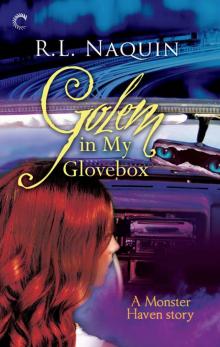 Golem in My Glovebox
Golem in My Glovebox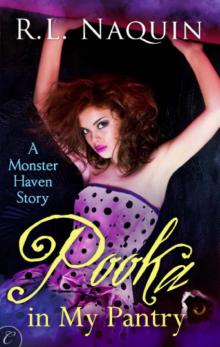 Pooka in My Pantry
Pooka in My Pantry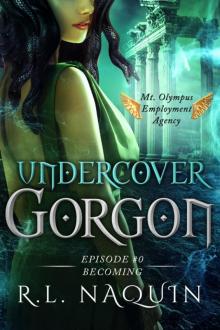 Undercover Gorgon: Episode #0 — Becoming (A Mt. Olympus Employment Agency Miniseries)
Undercover Gorgon: Episode #0 — Becoming (A Mt. Olympus Employment Agency Miniseries)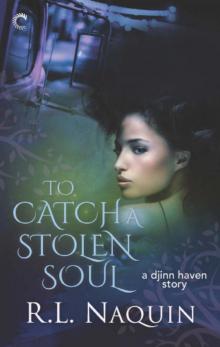 To Catch a Stolen Soul
To Catch a Stolen Soul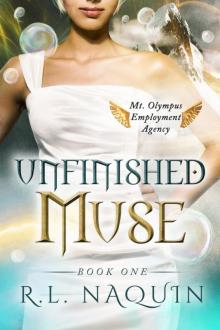 Unfinished Muse
Unfinished Muse To Seize a Wayward Spirit
To Seize a Wayward Spirit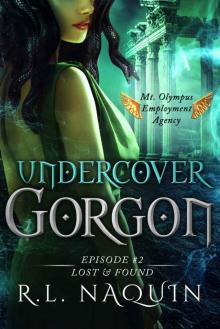 Undercover Gorgon: Episode #2 — Lost & Found (Undercover Gorgon: A Mt. Olympus Employment Agency Miniseries)
Undercover Gorgon: Episode #2 — Lost & Found (Undercover Gorgon: A Mt. Olympus Employment Agency Miniseries)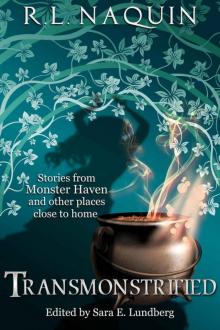 monster haven 06.5 - transmonstrified
monster haven 06.5 - transmonstrified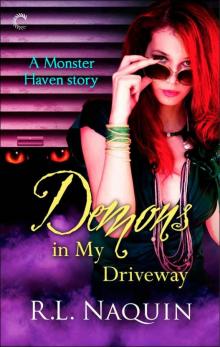 Demons in My Driveway
Demons in My Driveway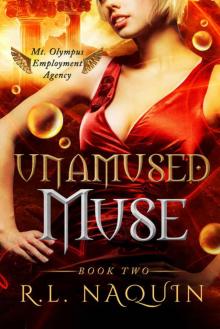 Unamused Muse (Mt. Olympus Employment Agency: Muse Book 2)
Unamused Muse (Mt. Olympus Employment Agency: Muse Book 2)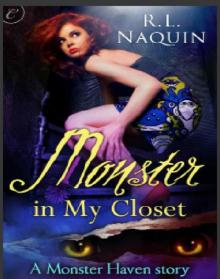 Monster in My Closet
Monster in My Closet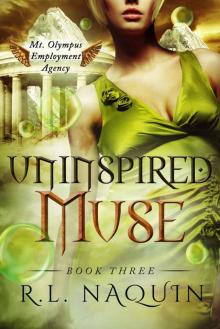 Uninspired Muse (Mt. Olympus Employment Agency: Muse Book 3)
Uninspired Muse (Mt. Olympus Employment Agency: Muse Book 3)